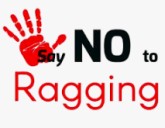Formal education and ethics / values are integral for achieving a just society based on equity sensitivity towards one another’s social and cultural likings and lineages. Education institutions provide an environment for inculcating spirit of brotherhood, tolerance for diversity of thought and belief. Ragging has emerged as the antithesis of the real sprit and intrinsic value system of education institutions. As such concerted efforts are required to put an end to this distasteful exercise under taken in the guise of introduction. Education and ethics have an essential place in all fields of life. They have a vital and productive role in social integration of students of all social and cultural backgrounds. In an academic environment of a school and a college or other institutes for higher education disciplined way of code and conduct is essential. However, many a times occurrences of ‘ragging’ emerges as a social menace. Such practices have no place in an academic institute and concerted efforts are required to be in place to prevent its occurrence at any point of time. In common parlance, ragging means playing practical jokes on somebody or teaching someone a lesson. The Hon’ble Supreme Court of India perhaps has given a more comprehensive meaning of ragging as: "Ragging is any disorderly conduct, whether by words spoken or written, or by an act which has the effect of teasing, treating or handling with rudeness any student, indulging in rowdy or indiscipline activities which cause or are likely to cause annoyance, hardship or psychological harm or to raise fear or apprehension thereof in a fresher or a junior student and which has the effect of causing or generating a sense of shame or embarrassment so as to adversely affect the psyche of a fresher or a junior student." The Ministry of Human Resource Development, Govt. of India has taken a serious note of the incidents of ragging and is of the view that stern action should be taken against those indulging in “ragging†so that these incidents are not repeated and exemplary punishment is meted out to those indulging in it.
Anti-Ragging Committee
| 1 | Dr. Sunita Raina | Department of Commerce | Convener |
| 2 | Dr. Anamika Baru | Department of Home-Sc. | Member |
| 3 | Dr. Shandilya Perminder | Department of Political Sc. | Member |
| 4 | Dr. Snobar Chib | Department of Punjabi | Member |
| 5 | Dr. Shivani Manchanda | Department of Economics | Member |
| 6 | Dr. Mohd. Majeed | Department of Urdu | Member |
What Constitutes Ragging?
- Any conduct by any student or students whether by words spoken or written or by an act which has the effect of teasing, treating or handling with rudeness a fresher or any other student;
- Indulging in rowdy or indiscipline activities by any student or students which causes or is likely to cause annoyance, hardship, physical or psychological harm or to raise fear or apprehension thereof in any fresher or any other student;
- Asking any student to do any act which such student will not in the ordinary course do and which has the effect of causing or generating a sense of shame, or torment or embarrassment so as to adversely affect the physique or psyche of such fresher or any other student;
- Any act by a senior student that prevents, disrupts or disturbs the regular academic activity of any other student or a fresher Exploiting the services of a fresher or any other student for completing the academic tasks assigned to an individual or a group of students.
- Any act of financial extortion or forceful expenditure burden put on a fresher or any other student by students;
- Any act of physical abuse including all variants of it: sexual abuse, homosexual assaults, stripping, forcing obscene and lewd acts, gestures, causing bodily harm or any other danger to health or person;
- Any act or abuse by spoken words, emails, post, public insults which would also include deriving perverted pleasure, vicarious or sadistic thrill from actively or passively participating in the discomfiture to fresher or any other student; and
- Any act that affects the mental health and self-confidence of a fresher or any other student with or without an intent to derive a sadistic pleasure or showing off power, authority or superiority by a student over any fresher or any other student.
Depending upon the nature and gravity of the offense as established the possible punishments for those found guilty of ragging at the institution level shall be any one or any combination of the following:
- Cancellation of admission
- Suspension from attending classes
- Withholding/withdrawing scholarship/fellowship and other benefit
- Debarring from appearing in any test/examination or other evaluation process Withholding results
- Debarring from representing the institution in any regional, national or international meet, tournament, youth festival, etc.
- Suspension/expulsion from the hostel
- Rustication from the institution for a period ranging from 1 to 4 semesters or equivalent period.
- Expulsion from the institution and consequent debarring from admission to any other institution.
- Collective punishment: when the persons committing or abetting the crime of ragging are not identified, the institution shall resort to collective punishment as a deterrent to ensure community pressure on the potential raggers.
Anti ragging committee is the supervisory and advisory body mandated to provide Ragging Free Environment in the college Campus. The committee works in close coordination with Discipline Committee, Students Welfare Committee and Psychological Cell to rid the college from the menace of ragging and create campus as a Zero Ragging Zone. The college anti-ragging committee interacts with the freshers to apprise them of their rights as well as duties with regards to the fight against ragging and to generate confidence in their minds so that any instance of ragging to which they are subjected or which comes in their knowledge shall be brought in the knowledge of authorities forthwith. The committee meets often to review the initiatives put in place to achieve the objectives of eliminating the menace of ragging within the Institution or outside and consider other measures which need to be taken in case any lacuna is observed. Further, the students are advised to keep mobile apps where they can register a ragging complaint by posting the photographs and videos of the students involved in ragging.The 1st year students are also advised to keep handy the College anti-ragging helpline numbers and the contact numbers of committee members and college principal. Action Points:- To act on the defaulters who are found guilty of ragging and/or abetting ragging, actively or passively, or being part of a conspiracy to promote ragging
- To generate an atmosphere of discipline by sending a clear message that no act of ragging shall be tolerated and any act of ragging shall not go unnoticed and unpunished
- Meet students in the students’ assembly and brief them about the Institution’s stand about ragging To decide the quantum of punishment to be imposed on the culprit students
- To decide the quantum of punishment to be imposed on the culprit students
- To take cognizance of any breach of discipline and suggest immediate disciplinary action in such cases
- Make students aware of dehumanizing effect of ragging inherent in its perversity Prepare fresher’s not to oblige to such practices if at all they face any but to report boldly by given written complaint and assurance them to maintain their confidentiality (if reported )
- Installation of complaints boxes and CCTVs at vantage and vulnerable points in the campus
- Posters on anti-ragging received from UGC put up on notice boards, canteen and hostels Adequate impetus given through hoardings/billboards kept at vantage points and through website
- Mandated Orientation Programs for freshers and parents to familiarize them with the Institutional rules and regulations inclusive of anti ragging measures, what constitutes ragging and the consequences to be faced.
- Both parents and candidates are requested to fill and sign an Affidavit on Anti ragging.
- To promptly and stringently deal with the incidents of ragging brought to the notice.
- Organizing rallies within and outside the campus as an awareness generation measure.
- Conduct competitions like essay/slogan writing, posters and paintings, oratorical etc. on ragging and/or anti-ragging to create awareness among students on the issues and derive solutions from their own student quarter, which help the Institution to sensitize the young minds on the malefic effects of ragging.
- Make surprise visits in classrooms and in hostels.
- Be vigilant for unanticipated events.
- Arrange for professional counseling sessions to prevent incidences for both seniors and freshers.
- The Institution’s website, prospectus for various programs, application forms, billboards help declare our strong ethos in functioning as a Ragging free campus.
- To maintain the records and reports regarding the ragging issues and documents.
- Regular policing by squad, volunteers and student’s council members in the beginning of the semester every year.
- Motivate to foster friendly relationships by staff and senior students and to eliminate the Attitude of Ragging, among the seniors.
- Organizing Fresher’s Day as a mark of welcome by Student’s council & seniors.
- Organizing Talents Day to bring freshers to the forefront and get introduced.
- Similar to Student’s council there also exists a hostel student’s council (union) who lend a friendly ear to the issues of the hostel freshers and make discreet random surveys.
- To implement and coordinate anti-ragging measures. Ensure anti ragging instructions are displayed at prominent places including canteen and hostels.
- To keep a continuous watch and vigil over ragging so as to prevent its occurrence and recurrence.
- To take immediate action on the occurrence of any incidence of ragging and to report it to the anti-ragging committee.
- The ragging committee will take action by looking at the severity of such ragging incidents within the campus or in the hostel.
- The 1st year students are advised to keep handy the local anti-ragging helpline numbers and the contact numbers of committees. Further, they are advised to keep mobile apps where they can register a ragging complaint by posting the students involved in ragging photos and videos.











